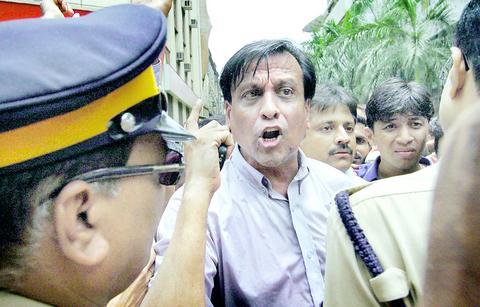Indian prime minster-elect Sonia Gandhi faced her first crisis yesterday, before even taking power, when pivotal leftists refused to formally join her government and markets crashed on fears over economic policy.
Shares on the Bombay exchange plunged almost 16 percent -- the worst fall in its 129 years -- before trading was suspended a second time. They later recovered to about 9 percent down, on top of heavy losses last week. The rupee also fell 0.8 percent yesterday despite central bank support.

PHOTO: AFP
The crash, including a big drop on Friday, has wiped billions of dollars off the value of India's listed companies. Hundreds of bro-kers and small investors protested outside the bourse on the day Gandhi was due to visit the president to claim power.

PHOTO:AFP
Leftist parties, which hold more than 60 of the new parliament's 545 seats, decided not to formally join Gandhi's Congress party and its allies in the coalition expected to be sworn in tomorrow. They have pledged to support her from outside on vital votes, such as confidence motions, but the decision has stoked concerns about the government's stability and fears the communists will wield their power without responsibility.
"The whole tug-of-war is economic policy. Either the left should be in the government and take responsibility for implementing those policies or they should give unconditional support if they are supporting from outside," said a trader with a leading brokerage in Mumbai.
"It makes no sense to remain outside and then dictate terms. Outside support will make the government that much more unstable," the broker said.
But Congress spokesman Jaipal Reddy said: "There are no doubts about stability of this government. There will be no difficulty."
Investors fear the leftists, led by the Communist Party of India (Marxist), the third largest party in the parliament with 43 seats, will block or slow key reforms in Asia's third largest economy, especially privatization of bloated state firms.
Senior Congress leader Manmohan Singh, the father of India's economic reforms more than a decade ago, stepped in quickly to reassure investors.
"We are not pursuing privatization as an ideology, but we are not against privatization where it is called for in the national interest," he told reporters. "Our fiscal and other policies will seek to create a favorable climate for enterprise."
But at exactly the same time, just a few kilometers from where Singh was speaking, communist leaders were calling for increased subsidies for farmers, the return of some import restrictions and the axing of the privatization ministry.
However, Communist Party of India leader A.B. Bardhan also said the parties would support some stake sales in government firms and welcomed foreign investment.
Analyst Prem Shankar Jha said the power of the communists after Congress' surprise ouster of the ruling Hindu nationalist-led coalition could take India back to the instability of the mid-1990s when leftists were also pivotal.
"By staying out, the communists will be free to criticize anything the Congress does. This will constantly erode the confidence in the government," he said.
The Italian-born Gandhi was expected to visit President Abdul Kalam to claim power yesterday, armed with letters of support totalling more than 320 seats. That includes the leftist bloc.
If Kalam agrees, her new government is due to be sworn in tomorrow, making her India's first foreign-born prime minister and the dynasty's fourth.

DITCH TACTICS: Kenyan officers were on their way to rescue Haitian police stuck in a ditch suspected to have been deliberately dug by Haitian gang members A Kenyan policeman deployed in Haiti has gone missing after violent gangs attacked a group of officers on a rescue mission, a UN-backed multinational security mission said in a statement yesterday. The Kenyan officers on Tuesday were on their way to rescue Haitian police stuck in a ditch “suspected to have been deliberately dug by gangs,” the statement said, adding that “specialized teams have been deployed” to search for the missing officer. Local media outlets in Haiti reported that the officer had been killed and videos of a lifeless man clothed in Kenyan uniform were shared on social media. Gang violence has left

US Vice President J.D. Vance on Friday accused Denmark of not having done enough to protect Greenland, when he visited the strategically placed and resource-rich Danish territory coveted by US President Donald Trump. Vance made his comment during a trip to the Pituffik Space Base in northwestern Greenland, a visit viewed by Copenhagen and Nuuk as a provocation. “Our message to Denmark is very simple: You have not done a good job by the people of Greenland,” Vance told a news conference. “You have under-invested in the people of Greenland, and you have under-invested in the security architecture of this

Japan unveiled a plan on Thursday to evacuate around 120,000 residents and tourists from its southern islets near Taiwan within six days in the event of an “emergency”. The plan was put together as “the security situation surrounding our nation grows severe” and with an “emergency” in mind, the government’s crisis management office said. Exactly what that emergency might be was left unspecified in the plan but it envisages the evacuation of around 120,000 people in five Japanese islets close to Taiwan. China claims Taiwan as part of its territory and has stepped up military pressure in recent years, including

UNREST: The authorities in Turkey arrested 13 Turkish journalists in five days, deported a BBC correspondent and on Thursday arrested a reporter from Sweden Waving flags and chanting slogans, many hundreds of thousands of anti-government demonstrators on Saturday rallied in Istanbul, Turkey, in defence of democracy after the arrest of Istanbul Mayor Ekrem Imamoglu which sparked Turkey’s worst street unrest in more than a decade. Under a cloudless blue sky, vast crowds gathered in Maltepe on the Asian side of Turkey’s biggest city on the eve of the Eid al-Fitr celebration which started yesterday, marking the end of Ramadan. Ozgur Ozel, chairman of the main opposition Republican People’s Party (CHP), which organized the rally, said there were 2.2 million people in the crowd, but